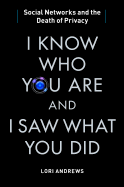
Lori Andrews's comprehensively researched I Know Who You Are and I Saw What You Did uses a slew of eyeball-singeing examples to strip away every assumption you might have about what can be legally gathered and disseminated about your Internet activity. If you're a typical online voyager, all your clicks and searches are automatically commoditized by the most bottom-feeding of consumer data profiteers. Andrews lays bare the impermanency and inaccessibility of so-called privacy settings, explains how tracking sites reinstate cookies and shows how information is collated from multiple sites to create uncomfortably specific individual profiles.
The consequences of inadequate online privacy can be a lot more serious than being followed by a shopping bot, particularly for women. Andrews, a law professor, cites cases in which mothers have lost custody of their children because judges deemed their online behavior too racy. Judges currently have wide latitude in deciding whether social network postings can be used as evidence to discredit rape victims. Conversely, women who've brought legal complaints for cyberstalking have been advised to just look away from the screen.
I Know Who You Are and I Saw What You Did is both a consumer alert and a treatise, and could serve as a cautionary-anecdote resource for parents who need to convince their offspring that colleges and employers may easily see their frolicking photos and puerile pontifications. Andrews balances her argument between privacy rights and freedom of speech, concluding, "We need a Miranda-type privacy warning for social networks." Until her proposed "Social Network Constitution" (or something similar) becomes law, remember that on the web you are overexposed. --Holloway McCandless, blogger at Litagogo: A Guide to Free Literary Podcasts

